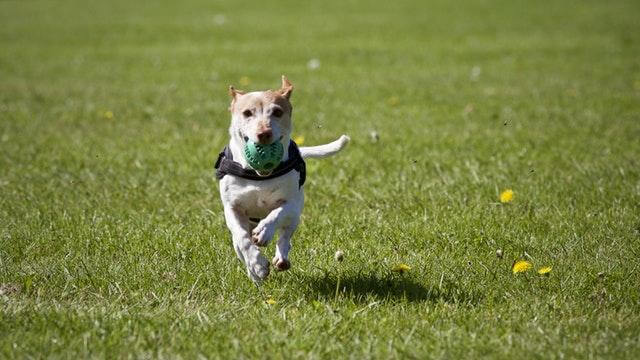
A dog’s normal behaviour can do significant damage to your yard. At the same time, your garden can do harm to your dog’s health. One example of a garden essential that can harm a dog is weed killer, for that weed-free flower garden. Weed killer can make dogs sick.
As such, you might want to consider dogscaping the yard or garden that your large rainwater tank is currently supporting.
Toughen Up the Turf!
Dog urine is rich in nitrogen, which is also present in fertilizers. And like with fertilizers, a high concentration can end up burning or maybe even killing the lawn. In order to make the yard more resistant to dog urine, seed with grasses known for resilience, like rye or fescue. A better option would be to make a mulched area where your pet can relieve itself. Make sure this area is marked with either a lawn decor or boulder. Train the dog so it’s able to associate that area with relieving itself.
Incorporate Non-Toxic Plants
Unlike humans, dogs are unable to sense if something isn’t safe for them to consume. And many of the most popular shrubs and flowers, such as ivy, hydrangeas, and daffodils, are so harmful to them. For this reason, it is essential that you do research on plants during the selection phase. And when picking mulch to use, cocoa hulls must be avoided, since these have theobromine, the very same chemical which makes chocolates harmful to dogs. Chip and bark mulches are obstructions to a dog’s breathing airways.
Make the Playing Field Appropriate
In places where pooches play, select hardy plants that dogs will have a difficult time harming, such as ornamental grasses. Such hardy plants are known for having massive root systems dogs cannot just pull out. When it comes to ground cover, you can go with perennials like wildflowers, clovers, or ‘Elfin’ thyme. Pea gravel must be avoided since these can get stuck in different parts of the dog. When it comes to edging, make use of smooth and round stones or dwarf shrubs. Metals and sharp gravel should never be used as edging in this context.
Fertilizers Safe for Dogs
It’s easy to assume that organic formulas are safe, but they aren’t. While it’s true that these contain animal products that dogs should be familiar with, like blood, fish meal, and bone, they can make dogs sick.
When making use of synthetic fertilizers, it’s important that you deeply water after application, and keep your canines off beds or lawns for at least one day.
When you apply fertilizers, avoid fertilizing the back and front yards at once. This way, there will always be a safe patch for your dogs. A safer bet is vegan fertilizer or compost.
Pesticides and Herbicides Free of Chemicals
Exposure to the usual weed and pest killers can cause stomach upsets, even cancer in the long run. So instead of these, you are better off with biological pesticides, herbicides fashioned from specific essential oils, and insecticidal soaps. Neem oil is another outstanding option, particularly when a capful of it is mixed with one gallon water plus a squirt of eco-friendly soap. This combination is capable of fighting fungal diseases that can affect both fruit and ornamental trees.
Sort out your slug or snail problems not with slug and snail baits, which have metaldehyde, a chemical fatal to your dogs. Kill snails or slugs with beer poured into a pie plate instead. Place the dish outdoors at dusk, making sure to leave it there overnight.



Leave A Comment